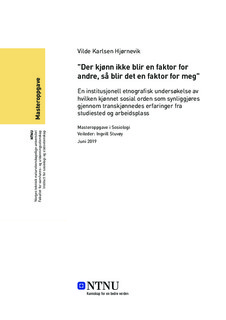| dc.contributor.advisor | Stuvøy, Ingvill | |
| dc.contributor.author | Hjørnevik, Vilde Karlsen | |
| dc.date.accessioned | 2019-10-04T14:00:16Z | |
| dc.date.available | 2019-10-04T14:00:16Z | |
| dc.date.issued | 2019 | |
| dc.identifier.uri | http://hdl.handle.net/11250/2620409 | |
| dc.description.abstract | Målet med dette prosjektet er å belyse hvordan kjønn eksisterer som sosial orden i utdannings- og arbeidsinstitusjoner ved hjelp av Dorothy Smiths institusjonelle etnografi som teoretisk og metodologisk rammeverk. Det finnes mye forskning på kjønnsforskjeller og likestilling innen utdanning og arbeidsliv, men formålet med denne oppgaven er å finne ut hvordan mennesker som daglig inngår i disse institusjonene opplever at kjønn spiller en rolle i deres hverdag. For å finne ut hvilken kjønnet sosial orden som preger hverdagen til mennesker som deltar i institusjonene, har jeg snakket med mennesker som definerer seg som binære og ikke-binære transpersoner.
Analysen tar utgangspunkt i 9 dybdeintervjuer med transkjønnede, og deres erfaringer har i tråd med institusjonell etnografi som rammeverk formet analysens innhold. I lys av erfaringene, argumenterer jeg for at det eksisterer en binær kjønnet sosial orden i institusjonene erfaringene oppstår i. En binær kjønnet sosial orden vil si en forståelse av at det eksisterer to kjønn: kvinne og mann. Dette synliggjøres i erfaringene informantene har med å gjøre kjønn på studiested/arbeidsplass, ulike kjønnede situasjoner de møter på i sin hverdag, samt gjennom strukturer som språk og infrastrukturer de forholder seg til i sin hverdag. Når noen av samfunnets viktige institusjoner som studiested og arbeidsplass preges av en binær kjønnet sosial orden, reiser det noen spørsmål om rammene og mulighetene for inklusjon innenfor disse institusjonene. | |
| dc.description.abstract | The aim of this thesis is to illustrate how gender exist as a social order in educational and working institutions by using Dorothy Smith’s institutional ethnography as a theoretical and methodological framework. Considerable research has been done on gender differences and equality within the field of education and working life, but the purpose of this thesis is to find out how people who daily enter into these institutions experience in what way gender plays a part in their daily lives. To find out which gendered social order it is that characterizes the daily lives of people participating in the institutions, I have talked to people who identify themselves as binary and non-binary transgender people.
The analysis is based on nine in-depth interviews with transgender people, and their experiences have in line with institutional ethnography worked as a framework for this analysis. In view of these experiences, I argue that social order is an understanding that there exists a binary gendered social order in the institutions these experiences arise in. A binary gendered social order would imply an understanding that there exist two genders: female and male. This is made visible in the informants’ experiences with doing gender in the place of study/working place, different gendered situations they meet in everyday life, as well as through structures such as language and infrastructures they relate to on a daily basis. When some of the society’s most important institutions such as place of study and work place are characterized by a binary gendered social order, questions about the frameworks and opportunities for inclusion within these institutions are raised. | |
| dc.language | nob | |
| dc.publisher | NTNU | |
| dc.title | Der kjønn ikke blir en faktor for andre, så blir det en faktor for meg | |
| dc.type | Master thesis | |
